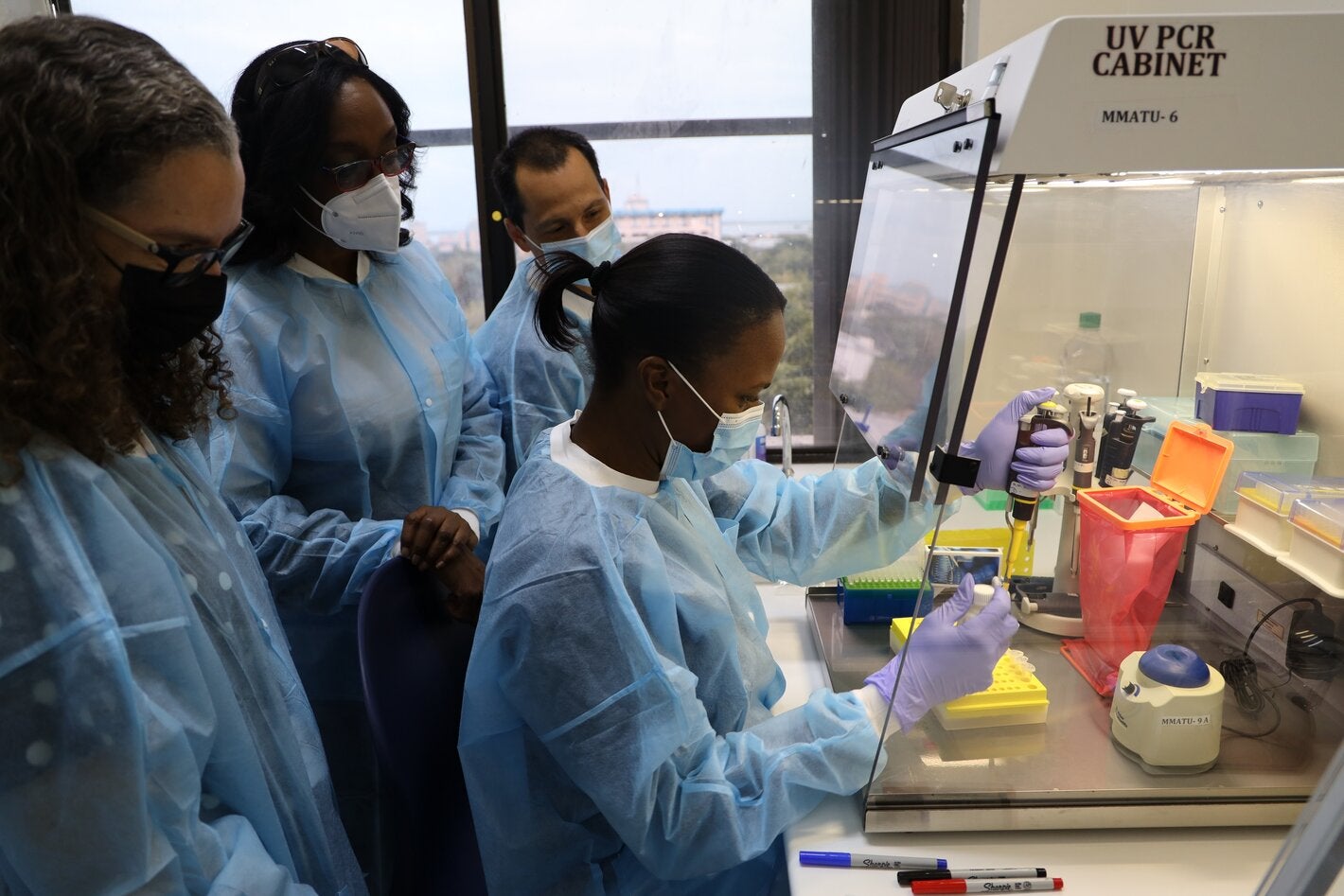
Kingston, Jamaica, June 18, 2022 (PAHO/WHO) – The Pan American Health Organization (PAHO) conducted a two-day training on the detection and laboratory diagnosis of monkeypox for laboratory technicians from Jamaica, the Bahamas, Guyana, Suriname, and St. Lucia. The in-person training was held at the National Public Health Laboratory on Wednesday, June 15, and Thursday, June 16.
During the activity, participants received hands-on instruction in molecular detection - real-time polymerase chain reaction (PCR) – of the virus that causes monkeypox, and review detection and diagnosis in the context of preparedness and response to potential outbreaks. Detecting the virus is the first step in preventing spread, disrupting chains of transmission, and stopping an outbreak.
“Raising awareness and bolstering local capacity to handle global health realities is a PAHO priority. Given the recent outbreak reported in several countries around the world that are not endemic for monkeypox, this training will strengthen national capacities to detect cases of this disease” shared Mr. Ian Stein, PAHO/WHO Representative to Jamaica, Bermuda and the Cayman Islands.
During the two-day training, national laboratories in the Caribbean received PCR primers and probes for the testing of the monkeypox virus. PAHO will continue supporting the full implementation of the diagnostic methodology within all countries trained. This week’s training for Caribbean countries was the second in a series of three training modules in the Americas.
Between May 13 and June 10 this year, the World Health Organization has been notified of 1423 cases of monkeypox in 31 non-endemic countries - that is, countries in which the circulation of the monkeypox virus is not typically found. Five of the countries are in the Americas namely, Argentina, Brazil, Canada, Mexico, and the United States.
Monkeypox is a zoonosis virus, a disease that can be transmitted to humans from animals. The infection is characterized by rash or skin lesions. In the current outbreak, the clinical presentation varies, with some patients showing few lesions on the perineal/perianal area, presenting even before symptoms such as fever, myalgia, and malaise. The sample for laboratory examination is taken from a person with symptoms of a skin lesion, and the result can take one to three days from the time the sample is received in the laboratory.
PAHO provides guidance to countries for the timely identification of all suspected cases, considering clinical and epidemiological evaluation. It also recommends sampling and the application of molecular detection protocols in national reference laboratories.
Transmission
Monkeypox can spread from person to person through close physical contact with someone who has symptoms. Respiratory secretion, lesion fluids, body fluids and scabs are particularly infectious. Clothing, bedding, towels, or objects such as cutlery and dishes that have been contaminated with the virus from contact with an infected person can also infect others.
Inoculation or through the placenta (congenital monkeypox) are other ways the virus is transmitted. There is no evidence that the monkeypox virus is transmitted sexually.
To prevent transmission, suspected and confirmed cases must be placed in separate well-ventilated rooms, at health care facilities or at home, dependent on clinical and psychosocial evaluations. Caregivers should practice proper hand hygiene protocols, use medical masks or respirators, gloves and gowns when coming in contact with the patient or their environment. Patient equipment, utensils, and clothing must be cleaned and disinfected after use, and their environment cleaned and disinfected frequently.
Treatment
There are no specific treatments against monkeypox virus infection. Symptoms usually resolve spontaneously. Clinical care should be optimized as much as possible to relieve symptoms, manage complications and prevent long-term sequelae.



